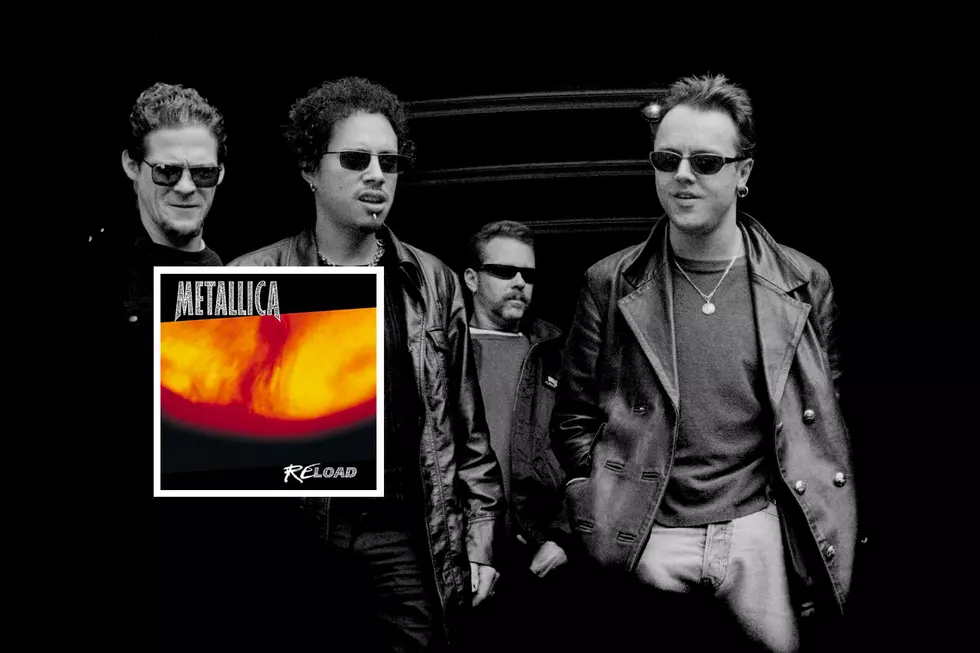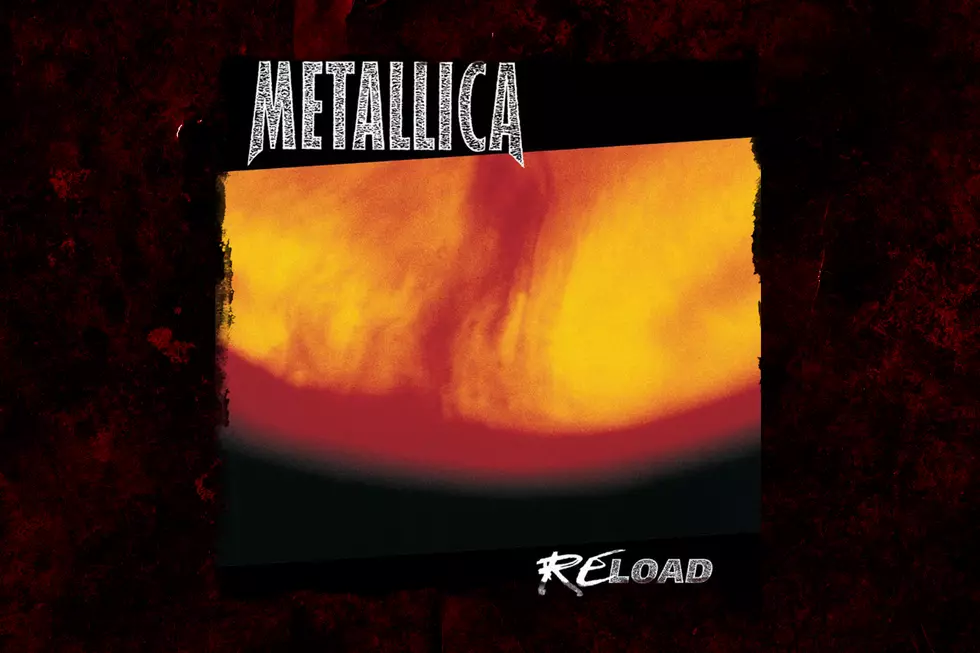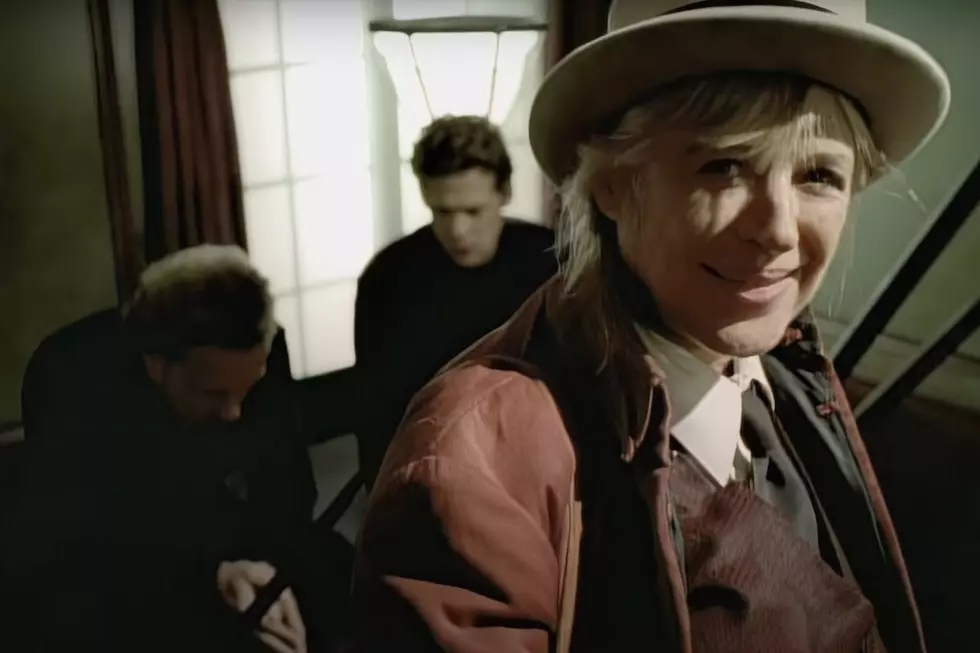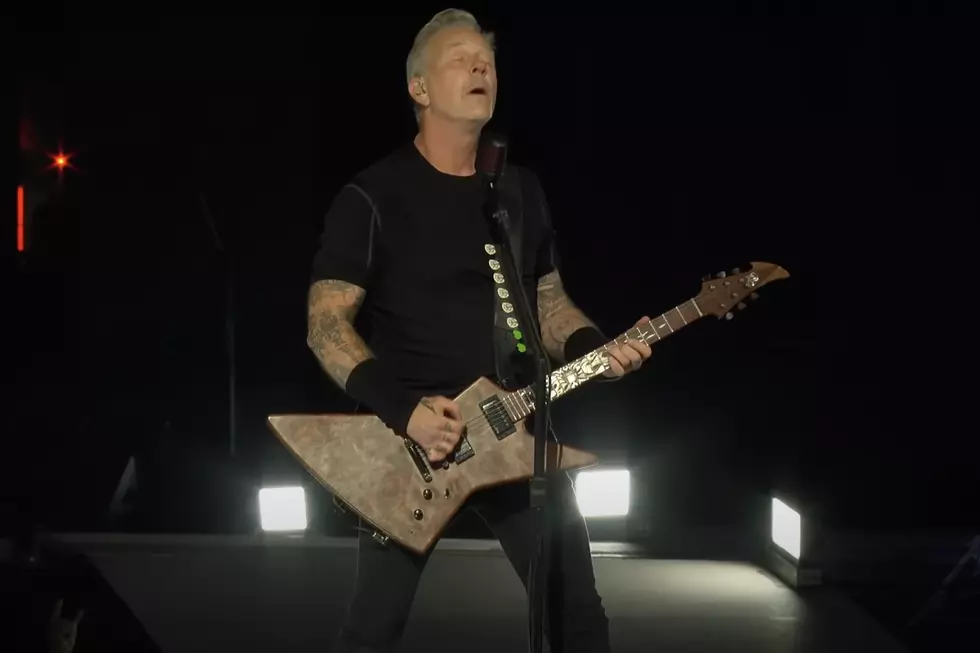
What Critics Said About Metallica’s ‘Reload’ When It Came Out
1996 was a big, complicated year for Metallica.
The release of their sixth studio album, Load, came with much criticism from fans and critics alike. Their headlining slot on the massive traveling Lollapalooza tour was met with chagrin as many Lolla supporters thought Metallica were too mainstream for the festival. And the bandmembers' hairstyles suddenly became a talking point in the rock community.
"The part I like most is we’re hated again," James Hetfield told David Fricke in Metallica's cover story in the June 27, 1996, issue of Rolling Stone. "I kind of miss that. People like us too much now."
Hearing his bandmate make the comment about being hated, Lars Ulrich didn't seem phased in the continued conversation about Load.
"This record and what we're doing with it—that, to me, is what Metallica are all about: exploring different things. The minute you stop exploring, then just sit down and fucking die."

In Metallica: The $24.95 Book, Ben Apatoff succinctly recognized, "Metallica is famous for not compromising or taking any shit," and because of that, the band continued its explorations in 1997 as they released their seventh full-length record, Reload.
While many fans expected this to be a disappointing compilation of songs that weren't good enough for Load, the band was adamant that it would stand on its own.
"People will instantly hear that all of these songs were written and developed at the same time as the stuff you heard on Load last year," Ulrich admitted in a 1997 interview on the television show, Channel [V]'s Speakeasy. "[But the songs haven't] been lying around and we're coming back to it. It's stuff we knew we wanted to develop ... It's a double album spread out over two separate records, spread out over a year and a half."
Hetfield added in the same interview, "I think these songs are more extreme...when we started recording Load, we went initially for the easier-to-record songs...then we ran out of time. These songs are kind of more wild, slower, heavier, faster."
By the time Reload came out, Metallica had been making music together for 16 years. Now, 25 years after the release of the album—and more than four decades into their career—we take a look back at what critics and journalists had to say when Reload hit the streets.
"Metallica sounds like it still cares"
The Miami Herald, Nov. 14, 1997Howard Cohen, a staff writer with The Miami Herald, seemed to agree with Hetfield's stance on the songs that comprised Reload, an album he called "heavier, brisker and bolstered by the aggressive "Fuel" and the slashing "Fixxxer."" While Cohen didn't mince words and admitted that Reload did sound familiar, he closed his review by stating, "Metallica sounds like it still cares. As a result, fans will, too."
George De Sota/RedfernsGeorge De Sota/Redferns "The music pounds hard"
The Boston Globe, Nov. 16, 1997Jim Sullivan's coverage of Metallica's Reload received a big spread in The Boston Sunday Globe; it didn't hurt that Sullivan had the chance to chat with Jason Newsted about the album. "These are in no way B-sides or the B-section or anything like that," Newsted reiterated to Sullivan about the songs on Reload. Throughout the conversation, it seemed as though Sullivan had nothing but praise to share about the album: "The music pounds hard, and Hetfield still enjoys lurching down a dark road ... As time goes by, Metallica adapts ... Metallica—always adept at tricky arrangements and turn-on-a-dime tempo shifts—has mastered melody."
"Metallica sounds as if it wants to be Aerosmith"
The New York Times, Nov. 18, 1997In a "critic's choice" column" in The New York Times, Jon Pareles reviewed releases by Celine Dion, Finley Quaye and Metallica. The latter received some...well, we'll just call it back-handed praise. "Metallica sounds like a skillful, brilliantly produced second-rank heavy metal band, reliving the 1970s with heftier guitars and more antisocial instincts." Pareles ended his thoughts by calling the album "standard blues-rock that's played with professional muscle," ultimately making the claim that "Metallica sounds as if it wants to be Aerosmith."
"A step in the right direction"
Fort Worth Star-Telegram, Nov. 18, 1997While Fort Worth Star-Telegram's pop music critic Dave Ferman argued Reload was "a step in the right direction" following Load, he led readers toward his ultimate claim: "The truth may simply be that Metallica's best days are past, and that from now on we'll have to content ourselves with hit-and-miss efforts like this." Unfortunately, Ferman didn't allow the 16 years that led to Reload to influence his prediction for the band's future, one that nobody will ever describe as "hit-and-miss," at least not with a straight face.
Ron Galella Collection, Getty ImagesRon Galella Collection, Getty Images "Apocalyptic metal sound"
Rolling Stone, Nov. 20, 1997Lorraine Ali assured readers that Reload rocks and wanted them to know that no matter what departures might exist on the album, it "is strongly rooted in the group's apocalyptic metal sound." Even so, Rolling Stone only gave the record three stars (out of five), though Ali seemed a bit more hopeful for the future than some of her peers: "Load and Reload are just steppingstones in the ongoing Metallica legacy."
"Consider yourself rocked"
Entertainment Weekly, Nov. 21, 1997Entertainment Weekly has always kept their reviews short and sweet, and in 1997, that remained true for their thoughts on Reload. Receiving a respectable "B" grading, Dan Snierson admitted that the album showed the band had lost some of the "gut-clenching heft" that fans had come to expect; "Still, consider yourself rocked."
"Hetfield still doesn't give a fuck"
Guitar World, December 1997In the December 1997 issue of Guitar World, Jon Wiederhorn joined the band in their studio to chat about Reload. Talking about one of Hetfield's guitars, Ulrich laughed and said, "He used to beat the shit out of that thing when we were on the tour for Kill 'Em All. That was back when he just didn't give a fuck." Wiederhorn quickly acknowledged, "In many ways, Hetfield still doesn't give a fuck ... while Load embraced boogie-blues licks, swaggering rock rhythms and swirling melodic hooks, Reload is more experimental." Weiderhorn wanted fans to know that no matter what the experiment sounded like, "Metallica haven't lost their penchant for crunching distortion and surging power; they've just couched it with more textural and dissonant embellishments."
Gie Knaeps, Getty ImagesGie Knaeps, Getty Images "Start of the end of a very great band"
The Morning Call, Dec. 13, 1997Gary R. Blockus was not a fan of Load or Reload, and he made sure the readers of Allentown, Pa.'s The Morning Call knew it. "Reload is one stroke too many in the wrong direction, sticking out like a clean, straight line in a Renoir ... Reload may signal the start of the end of a very great band that survived and thrived even after the exit of expert axman Dave Mustaine in the early days." Blockus heard nothing remarkable on the album, other than "Low Man's Lyric." As most fans knew then and know now, Reload was far from the beginning of Metallica's end.
Tim Mosenfelder, Getty ImagesTim Mosenfelder, Getty Images
More From Ultimate Metallica










